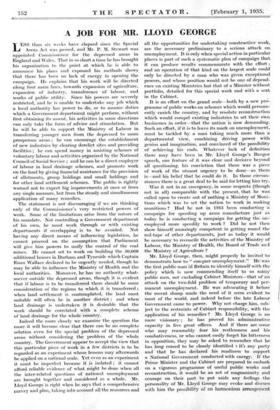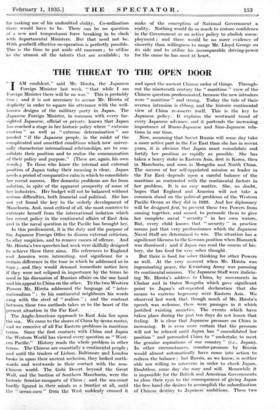A JOB FOR MR. LLOYD GEORGE L ESS than six weeks
have elapsed since the Special Areas Act was passed, and Mr. P. M. Stewart was appointed Commissioner for the depressed areas in England and Wales. That in so short a time he has brought his organization to the point at which he is able to announce his plans and expound his methods shows that there has been no lack of energy in opening the campaign. He explains that his work will be directed along four main lines, towards expansion of agriculture, expansion of industry, transference of labour, and works of public utility. Since his powers are severely restricted, and he is unable to undertake any job which a local authority has power to do, or to assume duties which a Government department might perform, without first obtaining its assent, his activities in some directions can only take the form of advice and stimulation. But he will be able to support the Ministry of Labour in transferring younger men from the depressed to more prosperous areas ; lie can encourage the establishment of new industries by clearing derelict sites and providing facilities ; he can spend money in assisting schemes of voluntary labour and activities organized by the National Council of Social Service ; and he can be a direct employer of labour in land drainage schemes, and promote work on the land by giving financial assistance for the provision of allotments, group holdings and small holdings and for other land settlement schemes. The public is rightly warned not to expect big improvements at once or from any single measure, but from the steady and simultaneous application of many remedies.
The statement is not discouraging if we arc thinking only of the Commissioner's very restricted powers of work. Some of the limitations arise from the nature of his mandate. Not controlling a Government department of his own, he must work through or with existing departments if overlapping is to be avoided. Not having any direct means of influencing legislation, he cannot proceed on the assumption that Parliament will give him powers to unify the control of the coal mines. He cannot set• to work on building the 50,000 additional houses in Durham and Tyneside which Captain Euan Wallace declared to be urgently needed, though he may be able to influence the Ministry of Health and the local authorities. Moreover, he-has no authority what- soever outside the depressed areas, though it is evident that if labour is to be transferred there should be some consideration of the regions to which it is transferred ; when land settlement is contemplated, the land most 'suitable will often be In another district ; and when- land drainage is undertaken it is desirable that the work should be correlated with a complete scheme of land drainage for the whole country.
Indeed the more closely we examine the question the more it will become clear that there can be no complete solution even for the special problem of the depressed areas without considering the problem of the whole country. The Government appear to accept the view that this particular piece of work in a feW 'districts is to be regarded as an experiment whose lessons may afterwards be applied on a national scale. Yet even as an experinient it must be imperfect because it is isolated ;' it cannot afford reliable evidence of what might be done when all the inter-related questions of national unemployment arc brought together and considered as a whole. .Mr. Lloyd George is right when he says that a comprehensiYe survey and plan, taking into account all-the resources and all the opportunities for undertaking constructive work, are the necessary preliminary to a serious attack on unemployment. It is only when special action in particular places is part of such a systematic plan of campaign that it can produce results commensurate with the effort ; and an operation of that kind on the largest scale could only be directed by a man who was given exceptional powers, and whose position would not- be one of depend- ence on existing Ministries but that of a Minister without portfolio, detailed for this special work and with a seat in the Cabinet.
It is an effort on the grand scale—both by a new pro- gramme of public works on schemes which would perman-. ently enrich the country, and by resolute reconstruction which would compel existing industries to set their own . businesses in order—tbat the nation 'is now demanding:. Such an effort, if it is to leave its mark on unemployment, must be tackled by a man taking much more thanj a departmental view, combining driving power with genius and imagination, and convinced of the possibility of achieving his ends. Whatever lack of definition there may have been in Mr. Lloyd George's Bangor speech, one feature of it was clear and decisive beyond all questioning, his conviction that there was a piece of work of the utmost urgency to be done—as there is—and his belief that he could do it. In those circurn- stances there is a great deal to be said for letting him trY. Was it not in an emergency, in some respects (though not in all) comparable with the present, that he was called upon to create out of nothing a Ministry of Muni- tions which was to set the nation to work in making munitions ? Had he not in 1915 been conducting 'a campaign for speeding up arms manufacture just' as today he is conducting a campaign for getting the un-' employed more speedily to work ? Did he not then show himself amazingly competent in getting round the red-tape of other departments, just as today it would be necessary to reconcile the activities of the MinistrY-
of
Labour, the Ministry of Health, the Board of Trade and the Ministry of Agriculture ? - Mr. Lloyd George, then,- might properly be invited 'to- demonstrate how to " conquer unemployment.' was the first public man iri Britain to identify himself with the policy which is now= Comniending itself 'to so Many - public men, not excluding Cabinet Ministers—thitt of -An attack on the two-fold problem of temporary and per- manent unemployment.. He was advocating it before the recent slump made. the need of it seem evident to most of the world, and indeed before the late Labour Government came to power. Why not charge him, sub- ject to the restraints of-Cabinet responsibility; 'with the application of his remedies 1 Mr. Lloyd George is no mere visionary ; he has proved his administrative capacity in five great offices. And if there are some- who may reasonably fear his restlessness and his combativeness, or who cannot easily forget his bitterness in opposition, they may be asked to remember that he has long ceased to be closely identified 'v it'z any party and that he has declared his readiness . to support a National Government conducted with energy. If the Prime Minister and the Cabinet are prepared to embark on a vigorous programme of useful public works and reconstruction, it would be an act of magnanimity and courage on their part to put aside any feelings the personality of Mr. Lloyd George may evoke and discuss with him the possibility of an harmonious arrangement for making use of his undoubted ability. Co-ordination there would have to -be. There can be no question of a new and tempestuods force breaking in to clash ' with departmental Ministers. But that need not be. With goodwill effective co-operation is perfectly possible. This is the time to put aside old rancours ; to utilize to the utmost all the talents that are available ; to make of the conception of National Government a reality. Nothing would do so much to restore confidence in the C-oVernrnent as an active policy to abolish unem- ployment ; and there would be no surer evidence of sincerity than willingness to range 'Mr. Lloyd George on. its side and to- utilize his incomparable driving-power for the cause he has most at heart.















































 Previous page
Previous page